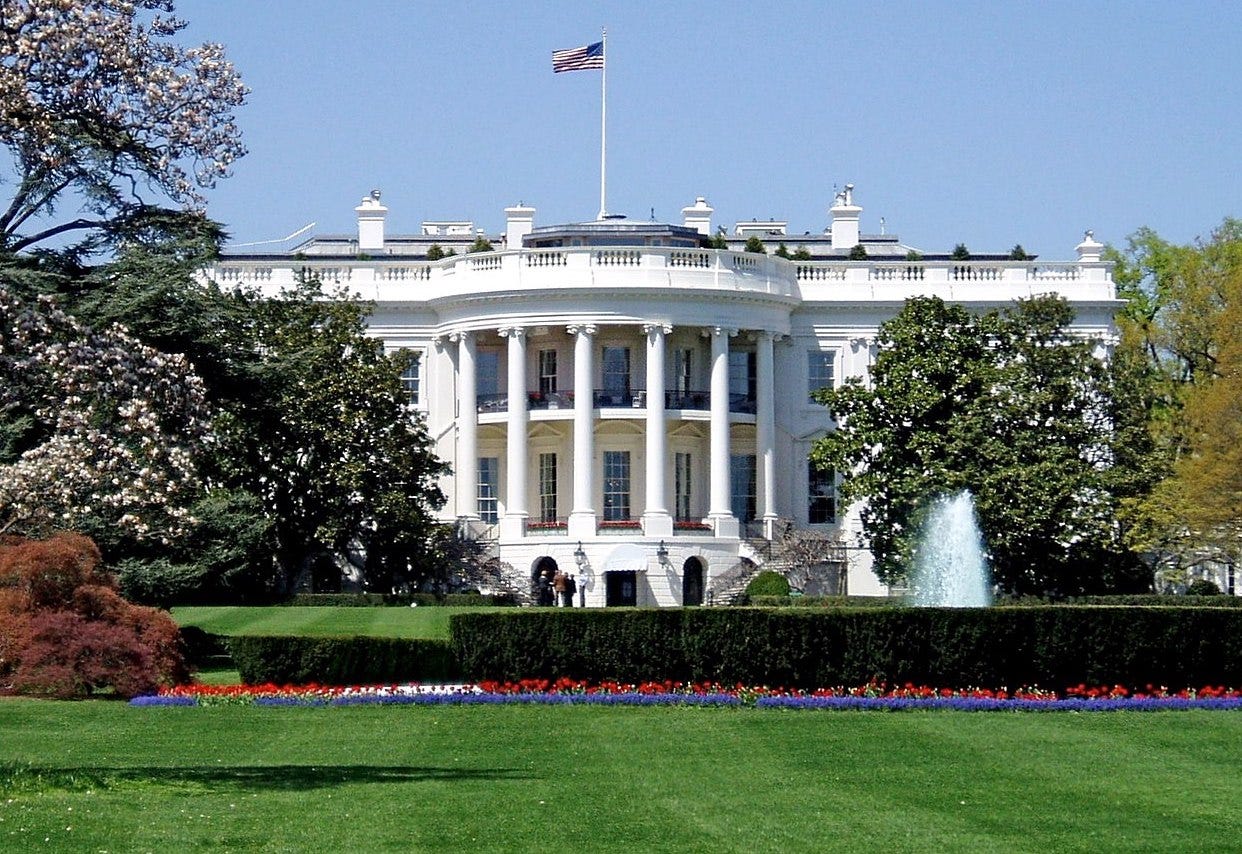President Biden is likely to win reelection in 2024. That’s partly because Biden is the incumbent. But it’s also because Republicans have hitched their wagon to Donald Trump, who is unpopular and will likely spend most of 2024 on trial.
Last September—in one of my most controversial forecasts—I predicted President Biden was very likely to run for reelection and a solid favorite to win if he did. Biden’s approval ratings were low, with voters concerned about his ability to be an effective president at his age. Inflation had peaked at the highest rate in forty years. But the fact is that incumbent presidents generally win reelection; a president’s approval ratings two years ahead of an election are not a strong indicator of their reelection chances; and inflation was likely to fall before the election kicked off. Meanwhile, likely Republican nominee and de facto head of the Republican Party Donald Trump was almost as old as Biden, even less popular, and on the verge of being indicted for a wide range of crimes.
Republicans’ national prospects have not improved since September. In fact, Republicans have been underperforming in special elections across the country. Trump has now been indicted in four separate cases and is supposed to surrender himself to the authorities today in Georgia. The charges against him are likely to hurt Republicans in competitive districts, but instead of moving on from him, Republicans are doubling down on Trump and Trumpist populism. Inflation, which has been keeping Republicans competitive with Democrats, has fallen back to almost normal levels.
Trump now faces an eyewatering 91 felony charges. In May, a jury in a civil trial also found that it was accurate to say that he raped journalist E. Jean Carroll. The charges against Trump brought by Manhattan District Attorney Alvin Bragg of falsifying business records related to payments Trump made before the 2016 election to cover up his affair with porn star Stormy Daniels—as reprehensible as his behavior was—are relatively minor and are not likely to change many voters’ minds. But charges in the other three cases—two of which involve conspiracies to alter the results of the 2020 presidential election—are extremely serious and compelling.
Another person in Trump’s position would probably go to jail. As a purely legal matter—and it isn’t a purely legal matter—Trump’s attempts to change the results of the 2020 election should probably already disqualify him from holding office again under the Disqualification Clause of the Fourteenth Amendment.1 But the fact that Trump is head of one of the two major political parties in the US—and that he has spent years working to essentially taint the national jury pool—will make it hard for the legal system to hold him accountable. Nevertheless, it will be hard for Trump to run for president while on trial in multiple jurisdictions. Even if he doesn’t end up being the nominee, his legal issues will make life hard for Republican candidates in competitive races because it will put them in the untenable position of taking a position on Trump’s behavior that appeals both to the Republican base and to moderate voters.
Whether Trump is the Republican nominee depends primarily on whether his legal issues somehow force him to drop out of the race. Ahead of the first Republican debate —which Trump didn’t participate in—he led second-place candidate Florida Governor Ron DeSantis by around 40 points. In the debate, the other candidates were occasionally critical of Trump, but only former Arkansas Governor Asa Hutchinson indicated he wouldn’t support Trump as the nominee if he was convicted in some of the charges against him. Most of the other candidates seem to be running to be Trump’s friend, in hopes of becoming his understudy if he drops out or his running mate if he stays in the race.
But the idea that Trump’s legal issues actually improve his chance of defeating Biden is pure conservative wishcasting. Republican primary voters may rally to Trump’s defense, but voters outside of the Republican base have made it clear over the last three elections that they’re ready to move on from him. Most Americans say they would definitely not support Trump if he’s the nominee. According to FiveThirtyEight, Trump’s net approval rating is a catastrophic -17 points. Biden may not inspire the same devotion that Trump does in his hard-core supporters, but nor does he also inspire the intense opposition Trump does. Trump’s trials will also ensure the 2024 election will again center around the fantasy—which voters soundly rejected in the midterm election—that Trump was the real winner of the 2020 election.
Republicans might have a somewhat better chance of defeating Biden if they were to nominate someone beside Trump. Another Republican wouldn’t inspire the same intense opposition Trump does. But if Republicans did nominate someone else, I think it’s very likely he’d tell his followers not to vote for the nominee. The party’s base would likely demand it continue to support Trump in any case. The party’s other policy priorities—to the extent it even has priorities beyond loyalty to Trump—are toxic to mainstream voters. Voters don’t actually want Social Security spending cut or abortion outlawed. Republicans have had some success stoking voter anxiety about “wokism,” but most voters don’t actually think drag queen story hour or critical race theory are the most important issues facing the country.
Recent special elections show the Republican strategy isn’t working. FiveThirtyEight found that Democrats outperformed their expected margins by an average of 10 points in 38 special elections this year. That analysis didn’t include liberal Janet Protasiewicz’s 11-point victory in a regular election for a state supreme court seat in normally purple Wisconsin. It also didn’t include the recent special election in Ohio, in which voters decisively defeated a measure that would limit their power and was aimed at preventing an abortion rights amendment from going on the ballot in November. Democrats’ success in these elections clearly has a lot to do with the unpopularity of Republican attempts to limit abortion access since the US Supreme Court overturned Roe v. Wade, as well as with the broad unpopularity of the Republican Party’s agenda.
Voter dissatisfaction with the economy—and in particular with rising prices—could still prevent Biden from winning reelection. The fact that the American economy has done well compared to most other countries in the wake of the COVID-19 pandemic has been little comfort to Americans who can afford less than they were able to a few years ago. But headline inflation has dropped from over 9% last year to close to 3% today, while unemployment has remained historically low. Real wages are starting to rise again and consumer sentiment is improving dramatically. There remains some risk of a recession, but the US economy looks to be in fairly good shape going into the 2024 election.
Last September, I wrote that Biden was very likely (80%) to be the Democratic nominee in 2024. I now think he’s almost certain to be the nominee unless he has a serious health problem between now and the Democratic convention. This April, I wrote that Trump had a little better than even odds (51%) of being the Republican nominee. Trump’s legal problems make this much harder to predict—some Republican primary voters might still defect if he’s convicted of some of the charges against him—but the relatively lack of opposition to his candidacy still make him a heavy favorite. Metaculus currently gives a Democrat a 56% chance of winning the presidency, but unless there is a severe recession in the US, I think Republican Party dysfunction makes the Democratic nominee very likely to win.
My Forecasts
Biden has a 93% chance of being the Democratic nominee in 2024
Trump has a 65% chance of being the Republican nominee in 2024
the Democratic nominee has a 70% chance of winning the presidency in 2024
Hearts in Hawai‘i are broken by the devastation caused by wildfires on Maui—which are still not been contained—that were spread through dry invasive grasses by high winds from Hurricane Dora. At least 115 people died in the fires and many more are still unaccounted for. Lahaina, the beautiful former capital of the Kingdom of Hawai‘i, was completely destroyed in the fires. If you’d like to help, the Hawai‘i Community Foundation’s Maui Strong Fund provides shelter, food, and financial assistance to fire victims. You can also give to the Maui Humane Society, which provides veterinary care to animals affected by the fire and is working to reunite pets with their families. Mahalo nui loa for your support of the Maui community.










Great post Robert! As a follow-on to Christopher North's comment, I'm curious how you think a recession would change these odds.
Great analysis, Robert! I wonder about sub-scenarios including: Biden encounters serious health issues prior to receiving the nomination — how does that change Democratic odds (who are the most likely nominees in that case); and Biden is the nominee but encounters health issues prior to the election (is there a mechanism to change the nominee)?